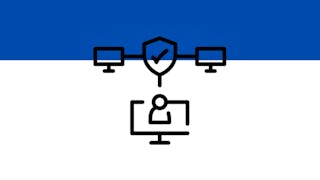If you are an associate-level cybersecurity analyst who is working in security operation centers, this course will provide introduction to network infrastructure and network security monitoring tools. By the end of the course, you will be able to:

Network Security
Seize the savings! Get 40% off 3 months of Coursera Plus and full access to thousands of courses.

Network Security
This course is part of Cybersecurity Operations Fundamentals Specialization

Instructor: Cisco Learning & Certifications
51,244 already enrolled
Included with
733 reviews
Skills you'll gain
- Infrastructure Security
- General Networking
- Network Administration
- Distributed Denial-Of-Service (DDoS) Attacks
- Network Monitoring
- TCP/IP
- Authorization (Computing)
- Network Infrastructure
- Malware Protection
- Load Balancing
- Vulnerability Assessments
- Network Security
- Network Protocols
- Authentications
- Intrusion Detection and Prevention
Tools you'll learn
Details to know

Add to your LinkedIn profile
23 assignments
See how employees at top companies are mastering in-demand skills

Build your subject-matter expertise
- Learn new concepts from industry experts
- Gain a foundational understanding of a subject or tool
- Develop job-relevant skills with hands-on projects
- Earn a shareable career certificate

There are 2 modules in this course
If you are an associate-level cybersecurity analyst who is working in security operation centers, this course will provide introduction to network infrastructure and network security monitoring tools. By the end of the course, you will be able to: •Describe ACL operation when using the established option • Describe the purpose of Access List Control lists •Describe network address translation (NAT) fundamental concepts • Explain the NSM tools that are available to the network security analyst• Describe the three types of NSM tools used within the SOC (commercial, Open Source, or homegrown) • Describe network-based malware protection • Describe the benefits of load balancing and web application firewalls. • Describe AAA • Describe basic models for implementing access controls over network resources. To be successful in this course, you should have the following background: 1. Skills and knowledge equivalent to those learned in Implementing and Administering Cisco Solutions (CCNA) v1.0 course 2. Familiarity with Ethernet and TCP/IP networking 3. Working knowledge of the Windows and Linux operating systems 4. Familiarity with basics of networking security concepts.
What's included
9 videos16 readings8 assignments1 discussion prompt
If you are an associate-level cybersecurity analyst who is working in security operation centers, this course will help you examine attacks that happen around the TCP/IP protocol suite. By the end of the course, you will be able to: • Explain how ARP provides the essential service of mapping IP addresses to physical addresses on a network • Describe legacy TCP/IP vulnerabilities • Describe vulnerabilities related to the IP protocol • Describe vulnerabilities related to the ICMP protocol • Describe vulnerabilities related to the TCP protocol• Describe vulnerabilities related to the UDP protocol • Describe the attack surface and its relation to an organization's vulnerability • Describe how network data is collected through a reconnaissance attack • Describe how an access attack is used to gain unauthorized access • Describe MITM attacks • Describe how DoS and DDoS attacks are used against networks• Describe how a reflection attack is used against IP hosts • Describe the concepts and use of spoofing attacks• Describe the concepts and use of DHCP attacks • Demonstrate several attacks against the TCP/IP protocol suite• Describe security flaws in the TCP/IP protocol and how they can be used to attack networks and host. To be successful in this course, you should have the following background: 1. Skills and knowledge equivalent to those learned in Implementing and Administering Cisco Solutions (CCNA) v1.0 course 2. Familiarity with Ethernet and TCP/IP networking 3. Working knowledge of the Windows and Linux operating systems 4. Familiarity with basics of networking security concepts.
What's included
16 videos35 readings15 assignments
Earn a career certificate
Add this credential to your LinkedIn profile, resume, or CV. Share it on social media and in your performance review.
Instructor

Offered by
Explore more from Security
 Status: Free Trial
Status: Free TrialCisco Learning and Certifications
 Status: Free Trial
Status: Free TrialUniversity of London
 Status: Free Trial
Status: Free TrialISC2
 Status: Free Trial
Status: Free Trial
Why people choose Coursera for their career

Felipe M.

Jennifer J.

Larry W.

Chaitanya A.
Learner reviews
- 5 stars
82.81%
- 4 stars
15%
- 3 stars
1.50%
- 2 stars
0.13%
- 1 star
0.54%
Showing 3 of 733
Reviewed on Jul 26, 2023
Great Introduction to some basic network security concepts, terminology, and domain perspective alignment for such a role.
Reviewed on Oct 13, 2024
I think need to be included little bit more practical video how about mitigate
Reviewed on Oct 18, 2023
many thanks for the opportunity. I was indeed a great course and made me to learn at a faster pace any content in network protocols and vulnerabilities

Open new doors with Coursera Plus
Unlimited access to 10,000+ world-class courses, hands-on projects, and job-ready certificate programs - all included in your subscription
Advance your career with an online degree
Earn a degree from world-class universities - 100% online
Join over 3,400 global companies that choose Coursera for Business
Upskill your employees to excel in the digital economy
Frequently asked questions
To access the course materials, assignments and to earn a Certificate, you will need to purchase the Certificate experience when you enroll in a course. You can try a Free Trial instead, or apply for Financial Aid. The course may offer 'Full Course, No Certificate' instead. This option lets you see all course materials, submit required assessments, and get a final grade. This also means that you will not be able to purchase a Certificate experience.
When you enroll in the course, you get access to all of the courses in the Specialization, and you earn a certificate when you complete the work. Your electronic Certificate will be added to your Accomplishments page - from there, you can print your Certificate or add it to your LinkedIn profile.
Yes. In select learning programs, you can apply for financial aid or a scholarship if you can’t afford the enrollment fee. If fin aid or scholarship is available for your learning program selection, you’ll find a link to apply on the description page.
More questions
Financial aid available,

